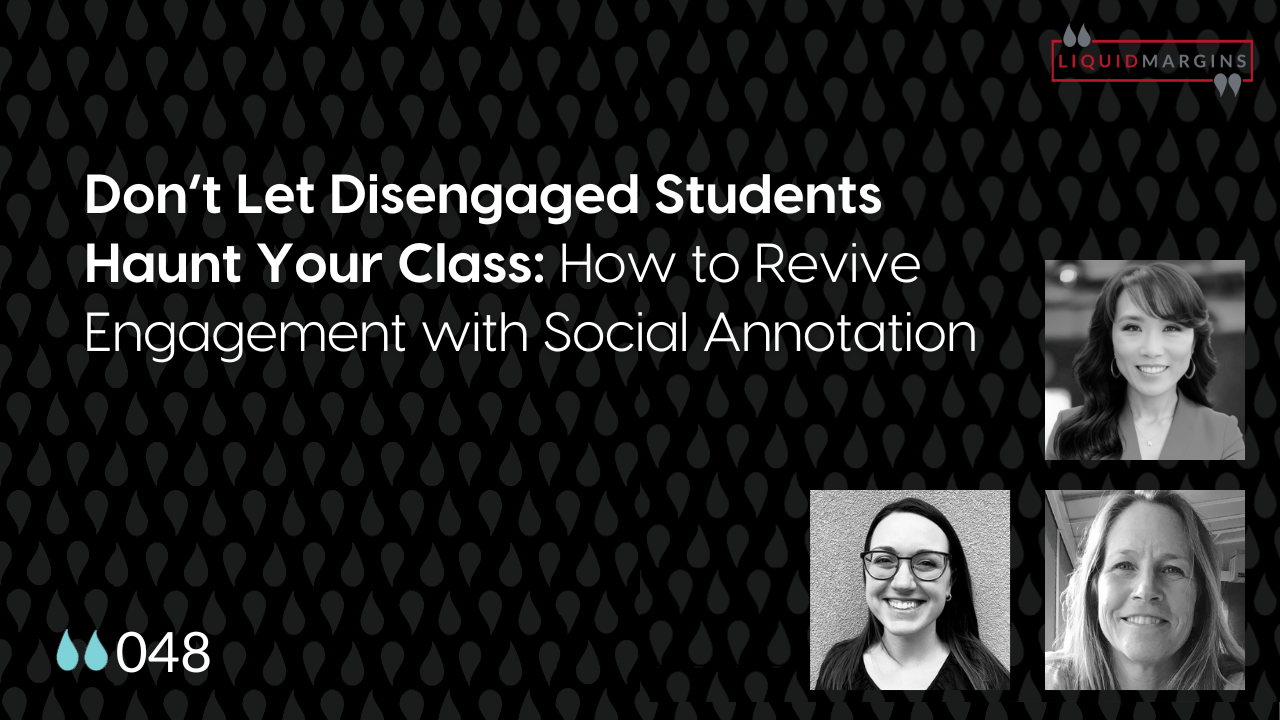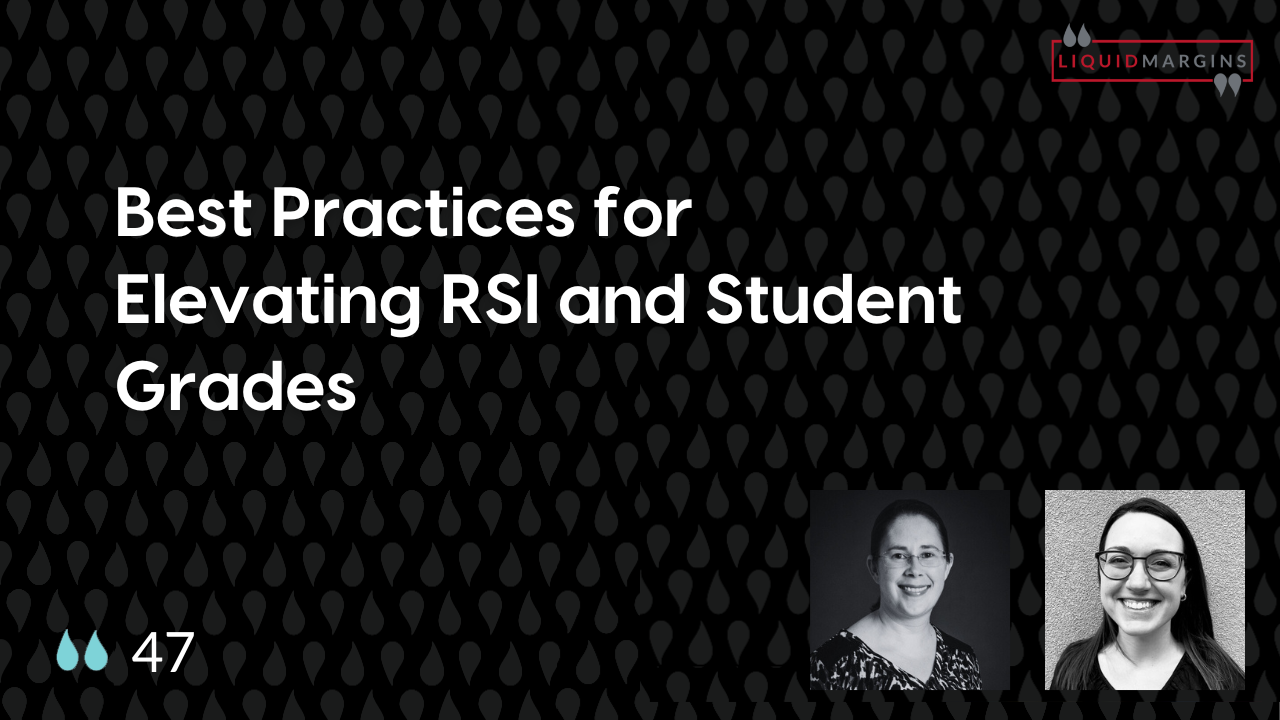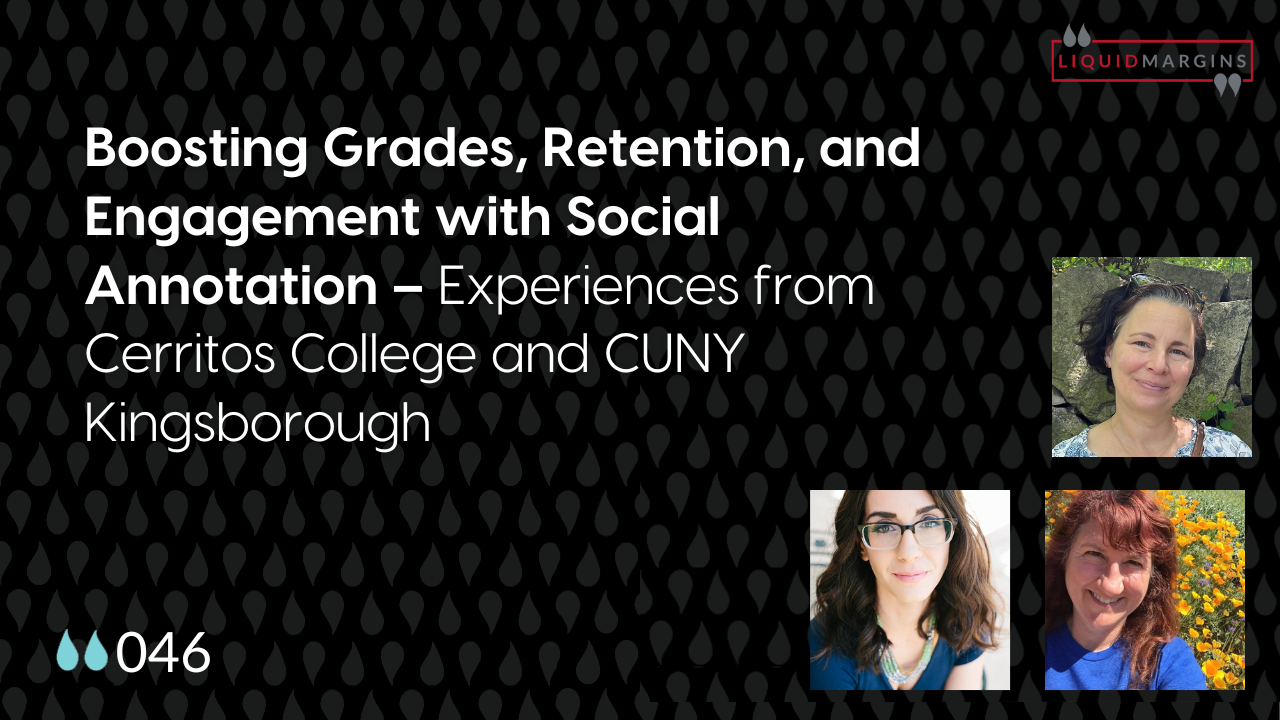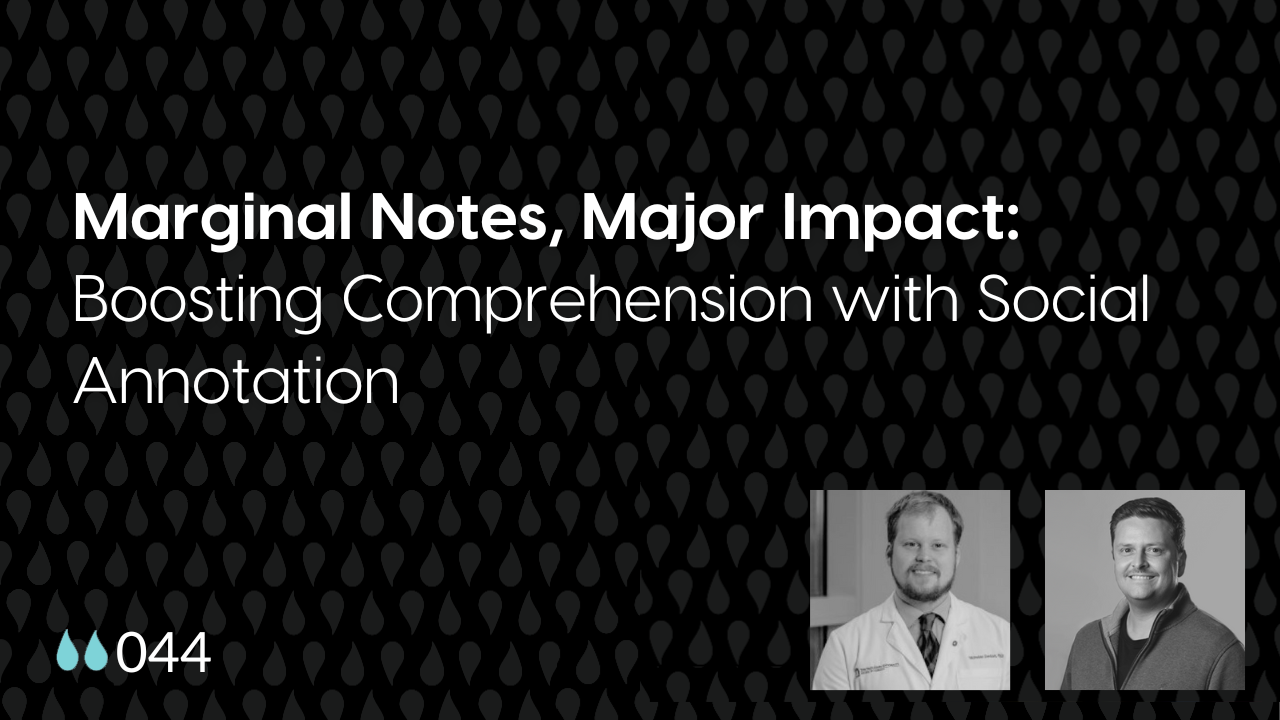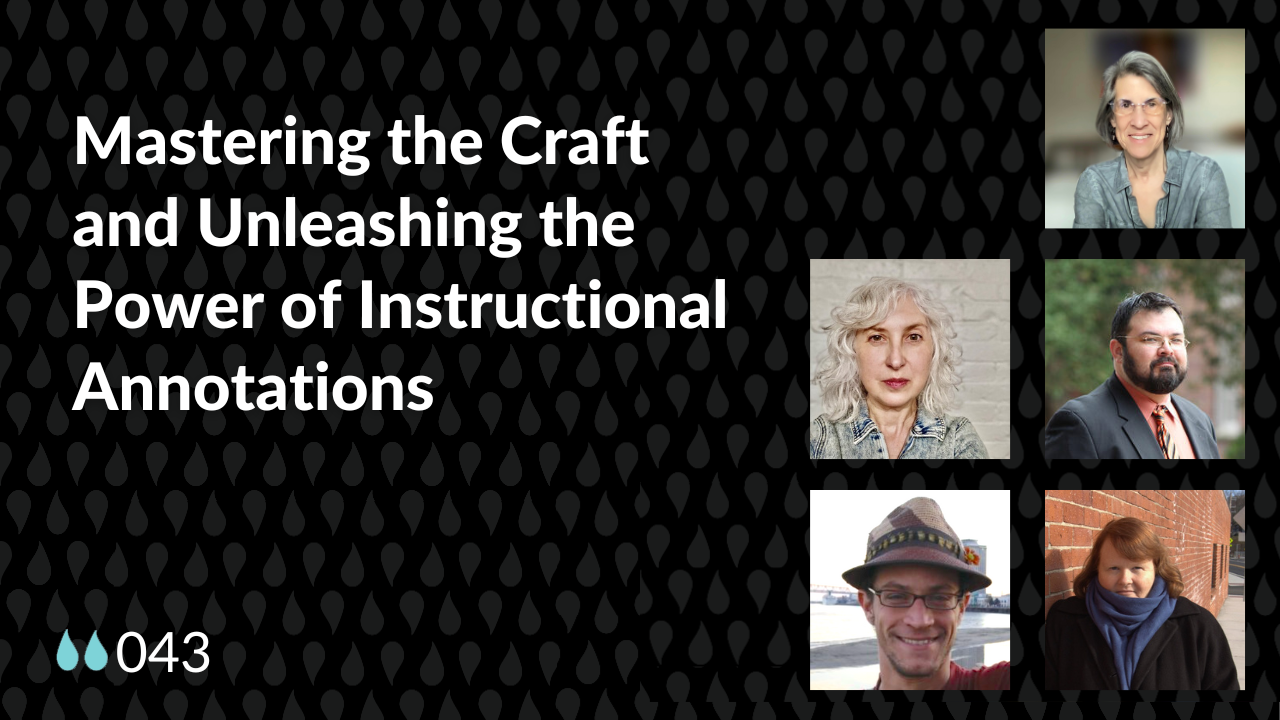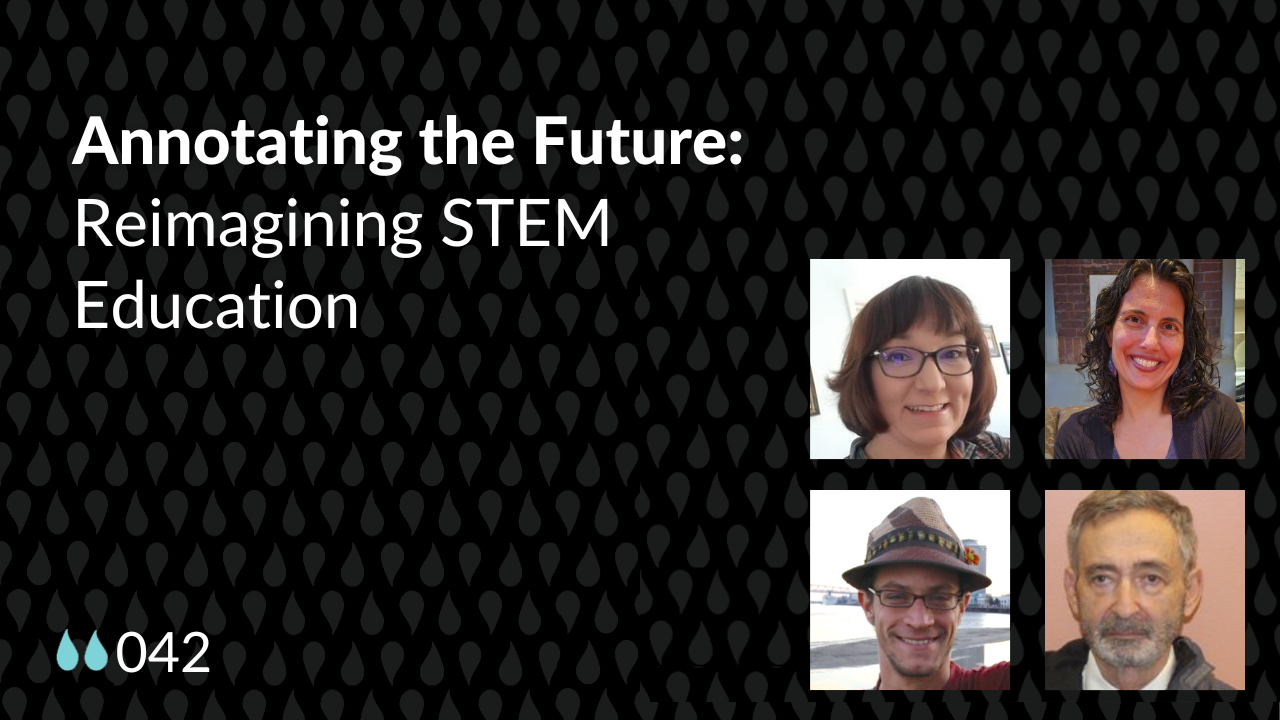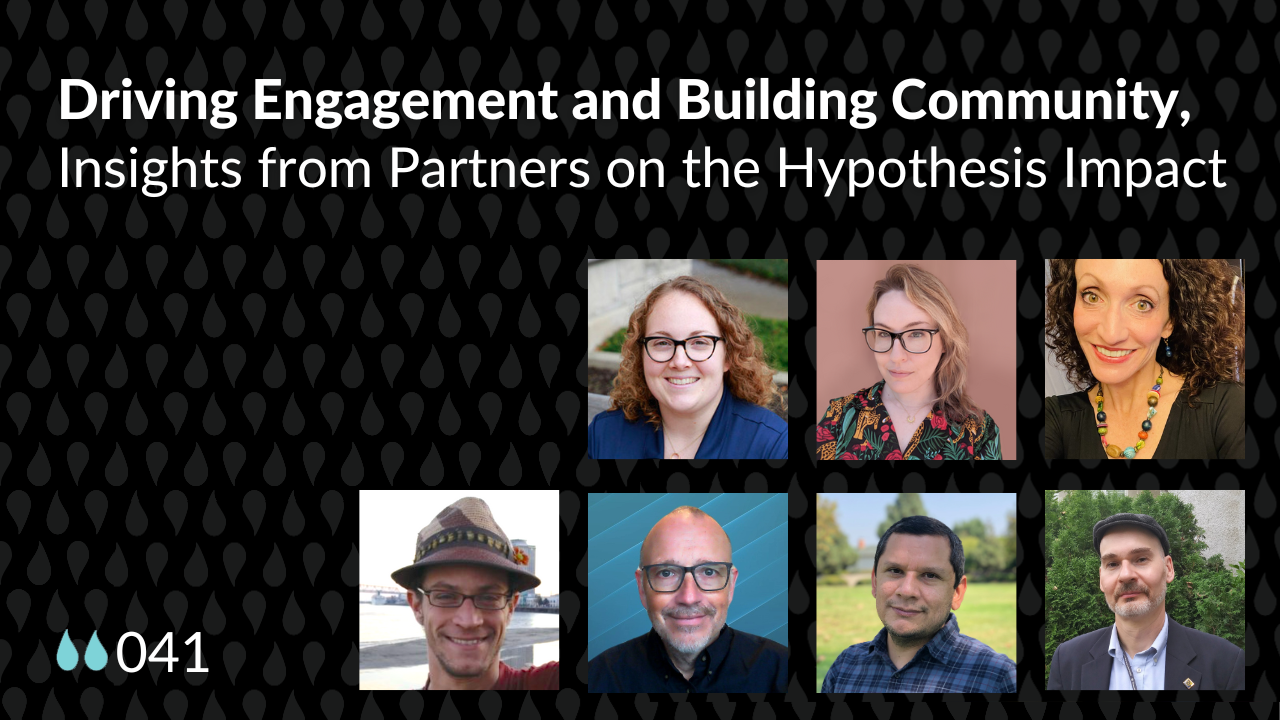Welcome to Liquid Margins, the show where we gather to talk about collaborative annotation, social learning, and other ways we make knowledge together.
Scroll down to join the conversation live by RSVPing for future episodes and find full recordings, clipped highlights, and shared resources from past episodes. You can also subscribe to the Liquid Margins playlist on YouTube to get all the recordings.

Subscribe to hear about all the upcoming Liquid Margins episodes and join us live for any show.
Join us for a special conversation featuring two outstanding educators from Virginia Tech. In this 45-minute webinar, we’ll hear how Dr. Deborah J. Good, Associate Professor in Human Nutrition, Foods, and Exercise, and Lauren DiSalvo, Collegiate Assistant Professor in the School of Visual Arts, are using social annotation to transform their classrooms. Whether they’re helping students better analyze complex scientific texts or engage more deeply with visual and cultural materials, both educators have found social annotation to be a powerful tool for building comprehension, sparking participation, and developing critical thinking across disciplines. What You’ll Learn: Firsthand Faculty Strategies: Hear how Deborah and Lauren bring texts and materials to life through annotation—no matter the subject. Cross-Disciplinary Applications: Explore how social annotation supports different teaching styles, learning goals, and course types. Real Results: Learn how active engagement leads to stronger understanding, more meaningful discussion, and better academic outcomes. Easy Integration: Get tips for implementing social annotation in your LMS with minimal setup and maximum impact. Whether you're just exploring social annotation or ready to take your use of it further, you’ll leave with actionable insights and inspiration from two educators leading the way in Virginia. Register Here
https://youtu.be/RqPL0wjup9M Creating and sharing Open Educational Resources (OER) gives educators the freedom to design flexible, affordable learning experiences. But what if you could take it even further? AI-powered tools are making it easier than ever to develop high-quality OER materials, and social annotation is transforming how students interact with course content. Join Diana Fordham, Missouri Southern State University, and the Hypothesis team for a dynamic conversation on how AI can streamline OER creation and how Hypothesis can make these resources more interactive, engaging, and effective for students. Key Takeaways: How AI can help you create adaptable, high-quality OER materials Ways to integrate Hypothesis to spark discussion and deepen student engagement Real-world examples of AI-generated OER in action Strategies to make OER more interactive and collaborative Best practices for keeping your OER content inclusive, effective, and impactful Why Attend? Whether you’re just starting with OER or looking to enhance your existing initiatives, this session will equip you with practical strategies and real-world applications to maximize their impact. Walk away with actionable insights to: Boost student engagement, performance, and equity with OER. Create high-quality, adaptable OER materials with AI to streamline content development. Leverage annotation data to demonstrate and improve the effectiveness of your OER content. Come ready to explore, ask questions, and walk away with innovative ways to make OER work better for you and your students!
https://youtu.be/N2G8UzFEx8o We’ve all been there: a class discussion falls flat, and the dreaded confession comes—your students didn’t do the reading. With attention spans under siege by TikTok, text alerts, and an ever-growing pile of to-dos, how do we reignite a love (or at least a tolerance) for closer reading? This webinar brings together educators from Rutgers University, and Contra Costa Community College to tackle the modern reading crisis head-on. We’ll dive into what’s holding students back and share practical, creative solutions to get them turning pages—and engaging with course materials like never before. From reimagining assignments to leveraging new tools such as social annotation, this is the conversation every educator needs. What You’ll Learn Why Students Aren’t Reading Uncover the key factors contributing to disengagement, from digital overload to shifting educational priorities. Proven Strategies to Increase Reading Engagement Hear success stories and actionable tips from fellow educators who’ve found innovative ways to inspire students to pick up the book—and finish it. The Power of Social Annotation See how collaborative tools like Hypothesis are changing the game, turning passive reading into an active, social, and rewarding experience. Practical Classroom Takeaways Walk away with ideas you can implement immediately to foster critical thinking, peer connection, and better learning outcomes. Whether you’re frustrated with unread assignments or simply looking to level up your teaching toolkit, this webinar is packed with insights, humor, and solutions to help students not just read—but engage. Let’s get those margins filled and the conversations flowing!
Are disengaged students haunting your course? It’s time to break the curse! In today’s classroom environment, keeping students engaged can feel like facing a legion of ghosts. Join us as we unravel the mysteries of how social annotation can bring your students back from the shadows and transform passive learners into active participants.
https://youtu.be/Bt7Ok1rqrlw?si=0VLlqCizbCrfEDRT Join us in this episode of Liquid Margins with Jennifer Young, Finance Officer and Adjunct Instructor at the University of Alaska Fairbanks (UAF), and how she transformed her courses by integrating social annotation to enhance regular and substantive interaction (RSI) and improve student outcomes. In this webinar, we will delve into the challenges faced by UAF in maintaining effective RSI in online courses, especially for non-traditional students managing multiple responsibilities. Discover how traditional discussion boards fell short, and how the innovative use of Hypothesis provided a dynamic and engaging solution. What You’ll Learn: Research-backed Assignment Strategies: Learn how Jennifer Young incorporated Hypothesis into her courses, moving away from traditional discussion boards to foster real-time interactions and deeper engagement with course materials. Best Practices for a Successful Semester: Understand how Young structured her courses to make Hypothesis annotations a central activity, requiring students to annotate, pose questions, respond to peers, and find external resources weekly. Comprehensive Guides and Resources: Gain insights into the implementation process and the concept of communities of practice, where knowledge is co-created and collaboratively contextualized. Webinar Highlights: Significant Increase in Interaction: Discover how the RSI in Young’s courses increased by 1400-2100%, with students posting nearly 40 times more annotations compared to traditional discussion boards. Enhanced Engagement and Improved Grades: See the notable decrease in failure rates (5-33%) and the increase in course grades (4-24%) achieved through Hypothesis, along with improved student retention and engagement. Reducing AI Misuse: Learn how Hypothesis helped build a supportive learning community and provided immediate feedback, bridging time gaps and reducing AI misuse. Interactive Q&A Session: Get your specific questions answered by our experts during the interactive Q&A session.
https://youtu.be/2N9am-UEcpA Welcome to a new episode of Liquid Margins, the video podcast by Hypothesis that dives deep into the world of social annotation and its impact on education. This episode, titled "Boosting Grades, Retention, and Engagement with Social Annotation," will feature a compelling discussion with Professors Francie Quaas-Berryman and Kristin Polizzotto from Cerritos College and CUNY Kingsborough Community College. Key Takeaways: Addressing Reading and Learning Challenges: Learn more about the challenges faced by educators in creating engaging and meaningful learning experiences. Our esteemed faculty guests will share their experiences and how they overcame it. Social Annotation as a Strategy for Success: Delve into the strategies employed by our guests to incorporate Hypothesis into their teaching. Discover how social annotation moved the needle on traditional reading and discussion formats, leading to significant improvements in student engagement and comprehension. Direct Impact on Student Outcomes: Discover the tangible outcomes of implementing social annotation, including dramatic improvements in student grades, retention rates, and overall class participation. Cultivating Community and Engagement: Explore the role of social annotation in building a vibrant learning community within the classroom and innovative ways our faculty panelists are implementing it. This episode of Liquid Margins is a must-watch for educators, instructional designers, and education technology enthusiasts looking to harness the power of social annotation to boost student outcomes. Join us as we uncover the strategies, challenges, and triumphs of integrating social annotation into the classroom, straight from the educators who've experienced it.
https://youtu.be/eyrnhYe3N4I Dive into the forefront of educational innovation with our latest Liquid Margins episode, “AI and the Future of Learning - Trends, Challenges, and Opportunities”. Scheduled for Thursday, February 15, at 1pm ET, this episode is set to provide an in-depth exploration of the transformative role and evolving impact of Artificial Intelligence (AI) in the educational landscape. Joined by faculty from SUNY New Paltz, The University of Oklahoma, and College of Western Idaho, in this episode we will explore the advancements, challenges, and significant transformations AI has introduced to education. We'll also predict the future of AI in education in 2024, with a focus on: The Evolution of AI in Education: Examining the changes and developments in the educational landscape due to AI since our last discussion. Innovations and Impacts: Highlighting key AI advancements and their transformative effects on teaching and learning. Challenges and Solutions: Discussing the obstacles encountered in integrating AI into educational systems and the solutions forged. The Role of Social Annotation in AI: Explore how social annotation can be used to mitigate the challenges of AI in the classroom and enrich learning experiences. Looking Ahead: Predicting the future of AI in education, exploring expectations and possibilities for educators, students, and administrators. Regardless of your experience level with social annotation, this episode is designed to offer valuable insights on AI in your classroom and provide strategies for AI and social annotation for 2024. Expect to gain practical tips and immediately applicable strategies for your courses.
https://youtu.be/4d9PEt1jUG8 Join us for an exploration into the groundbreaking research from Nicholas Denton, senior lecturer of pharmacy education and innovation at Ohio State University. During this episode of Liquid Margins, we'll traverse the challenges Professor Denton faced with his students, especially when confronted with intricate research-oriented texts, and their imperative need for research literacy. We’ll dive deep into the transformative influence social annotation had that not only shattered barriers of complex jargon but also created an environment where undergraduate students achieved an impressive 2x increase in graduate-level comprehension. Discover the near-perfect student engagement levels, the psychological safety social annotation extended to underrepresented groups, and its role in fostering professional identity, particularly evidenced by the significant improvements in student self-efficacy.
Do you want to transform the way you engage students and stimulate active learning? Join us for "Liquid Margins 43: Mastering the Craft and Unleashing the Power of Instructional Annotations" on August 1st at 12 PM ET, an exploration into how educators themselves annotate the margins of course texts to bring their readings alive for students and inspire student engagement. Get ready to dive deep into pedagogical strategies. From instructors who create annotations as signposts or discussion prompts on a reading to those who focus on responding to student questions and comments to further the conversation, you’ll learn best practices for instructional annotation from active Hypothesis educators. Join us as we uncover how these small notes in the margin can lead to major breakthroughs in learning.
Social annotation has seen widespread adoption in reading-intensive humanities courses. But reading is important in STEM education too, and social annotation can be leveraged to address the unique pedagogical challenges and opportunities in STEM disciplines. Tune into our next exciting installment of Liquid Margins, titled Liquid Margins 42: Annotating the Future, Reimagining STEM Education on June 28th at 12 PM ET. We will journey through the landscape of social annotation with a special focus on STEM fields, from computer science to biology to mathematics. Hear directly from STEM educators who have successfully integrated social annotation into their teaching. Whether you're a STEM educator looking for new ways to engage your students, or you're just curious about the intersection of technology and education, this episode will provide you with valuable insights. Let's learn together and reimagine the future of STEM learning.
Join us for an enlightening episode of Liquid Margins where we delve into the transformative journey of Hypothesis adoption. In this episode, we will hear firsthand accounts from some of our strongest partners about the remarkable impact of social annotation on teaching, learning, and collaboration within their educational institutions.
In this episode, "Liquid Margins 40: Leveraging Social Annotation to Enhance Open Educational Resources", we will explore the benefits of using Hypothesis to annotate OER, such as promoting active learning, amplifying student voice, fostering collaboration, and creating more personalized and inclusive learning experiences. Watch and discover the power of social annotation for open education!
RSVP for Liquid Margins 39, "Inclusivity and Social Annotation: Fostering Diverse Learning Environments". Guests include Dr. Sophia Rahming of Florida State University, Katherine Gaffney of the University of Southern Mississippi, and Dr. Jasmine Noelle Yarish of the University of the District of Columbia.
This fall, once again, we are afloat in a sea of uncertainty. Will we be face-to-face? Hybrid? Hyflex? Or just high anxiety? No matter where we find ourselves in autumn, one thing’s for certain: We can anchor class community in reading using social annotation. Join us as we share the screen with educators who have long been using social annotation to make reading active, visible, and social.
Just in time for fall, join us for a timely discussion with instructional designers on best practices for rolling out Hypothesis social annotation at your school. Topics will include goals for your pilot, steps to implement the pilot successfully, communication strategies, and engaging faculty on ways to use social annotation in the classroom.
Social reading is increasingly making its way into K12 schools. On this episode of Liquid Margins, we’ll be joined by Morgan Jackson and Joe Dillon, high school teachers who focus on reading, writing, and literacy. We’ll discuss their methods and practices for teaching with social annotation, and all the ways secondary school educators can use the margins to build reading comprehension and classroom community.
In 2020, schools around the world scrambled to adopt tools to enable remote learning during the COVID-19 pandemic. Many teachers found new ways to engage their students in reading using Hypothesis social annotation. Discover how the benefits of reading together with annotation go beyond remote learning.
This special edition of Liquid Margins coincides with our free AnnotatED workshop kicking off OLC Innovate 2021. Join us at 8am PT along with educators presenting at OLC Innovate for a conversation anchored in texts, showing how social annotation builds understanding, connections, and community. Or hop on at 9am PT for Liquid Margins as we meet up with educators using social annotation to help students read, interpret, and comment on scientific texts.
Social annotation is gathering momentum all around the globe. In this episode of Liquid Margins we “travel” to Ontario, Canada, to discuss how the pedagogical practice is gaining traction in Canadian higher education. We're joined by Associate Professor of History at Trent University Olga Andriewsky and Trent University Department of Psychology Associate Professor Fergal O’Hagan.
Members of the #DHReads community join Liquid Margins to talk about how they use social annotation in their digital humanities virtual reading group. Andy Boyles Petersen from Michigan State University, Arun Jacob from the University of Toronto, and Hayley Stefan from the College of the Holy Cross share their experiences using Hypothesis as a way of meaning-making and community-building, especially during the COVID-19 pandemic.
This episode of Liquid Margins focuses on using social annotation in the teaching of foundational English and composition courses, and it covers Hypothesis' research partnership with Indiana University — a multi-year study investigating how social annotation improves reading and writing practices for undergraduates in core English literature and composition courses.
Hypothesis scholar in residence Remi Kalir will lead a discussion on the ways social annotation can meet those challenges and even enrich the practice of teacher education. Dr. Kalir’s guests are “educators’ educators” Lysandra Cook, Associate Professor of Education at the University of Virginia, INFOhio Instructional Specialist Matt Yauk, and Charles Logan, Doctoral Student in Learning Sciences at Northwestern University.
Join guests Maha Bali from American University in Cairo, Mia Zamora from Kean University, and Autumm Caines from the University of Michigan as they share the screen to converse about the equitable, pedagogical, and practical ways they use collaborative annotation and social learning to help make classes hospitable to all students.
Kyle Denlinger, Digital Pedagogy and Open Education Librarian at Wake Forest University, and Michael McGarry, Lead Instructional Technologist at California State University Channel Islands, share how they integrate new practices and tools — including Hypothesis collaborative annotation — at their institutions.


